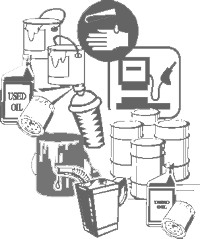 Household Hazardous Waste Collection
Household Hazardous Waste CollectionThe United States Environmental Protection Agency (EPA) considers a substance hazardous if it is toxic (insecticides and pesticides), flammable (oil-based paints, gasoline, paint thinner, stains), corrosive (cleaners and pool acid) or reactive (strong fertilizers and pool chlorine).
Household hazardous wastes are disposed of improperly when poured down the drain, on the ground, in storm sewers or in the trash. The dangers of such disposal may not be immediately obvious, but certain household hazardous wastes can contaminate septic tanks or wastewater treatment systems; harm children and pets and cause injury or sanitation workers. When poured in storm drains, contamination of the local water body occurs.
Many homes and garages in Fort Bend County are currently storing products, which are classified as hazardous by the EPA. An estimated 1.6 million tons of household hazardous waste are generated by Americans each year. Officials estimate that between three and 10 gallons of cleaning products, solvents, automobile fluids, garden chemicals, fertilizers and other materials hazardous to human health or the environment can be found in the average household. When these products are no longer needed or wanted, they are called household hazardous waste and should receive special storage, handling and disposal.
The Fort Bend County’s Solid Waste Advisory Committee is proud to offer a Household Hazardous Waste Collection for Fort Bend County’s citizens. The collection site will be staffed by personnel trained to handle hazardous waste and the materials collected will be disposed of according to EPA regulations.
